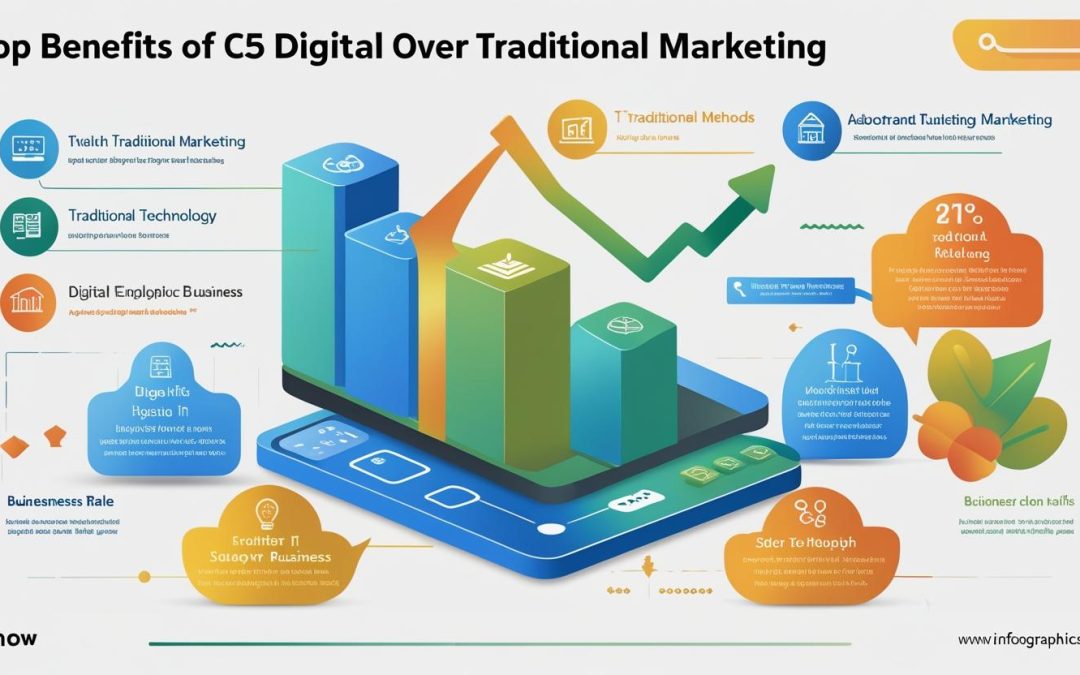
by Shashikanth Heerekar | Jun 26, 2025 | All Things about Marketing
Digital marketing offers better targeting, lower cost & real-time results. Please find out how it outperforms traditional ads for modern businesses.
Introduction
Marketing has undergone significant changes—from traditional to digital. Now, we use phones and computers. Digital and non-digital marketing help sell stuff. Some of the advantages of online advertising are fast reach and easy sharing. The advantages of website marketing and web marketing include 24/7 selling. However, there are also limitations to Internet marketing. Still, the benefits of digital multimedia are super cool.
Defining Digital Marketing: Key Characteristics and Components
1. What is Digital Marketing?
Digital marketing is the use of phones, computers, and the Internet to advertise goods and services to others. It’s fun because you can see cool videos or ads online. There are digital marketing pros, such as reaching people quickly. However, digital marketing has its drawbacks, such as requiring a stable internet connection and sometimes becoming too complex. That’s why we need to consider the advantages and disadvantages of digital marketing before implementing it.
2. Traditional Marketing vs. Digital Marketing
In the past, people sold things using newspapers, posters, and radio advertisements. These are called traditional marketing advantages. One big advantage of conventional marketing is that you don’t need the Internet! But it’s slow and hard to change, which are disadvantages of traditional marketing. When discussing the pros and cons of marketing, it is essential to consider both types. Marketing pros and cons help us pick the best way to share our ideas.
3. Benefits and Cons of Traditional Marketing
Traditional marketing benefits are particularly suitable for older individuals or those without internet access. It feels more real and trusted, which is another advantage. However, printing ads can be costly and time-consuming, which are disadvantages of traditional marketing. We must always consider the advantages and disadvantages of digital advertising to make informed choices.
4. Which One is Better?
It depends! Some prefer the new approach, which utilizes phones and computers and appreciates the digital marketing advantages. Others still prefer the old way due to its traditional marketing advantages. But no matter what, both have good and bad sides. So, when considering marketing pros and cons, remember that every idea has both bright and not-so-bright aspects.
Enhanced Reach and Targeting: The Advantages of Digital Marketing
Digital marketing is like magic! With a single click, you can reach everyone on the planet. That’s one of the big digital marketing pros. Unlike traditional marketing methods, which often involve using posters or flyers, digital approaches are faster and more engaging. With the Internet, you can show ads on YouTube, Google, or Instagram. These are all online marketing advantages!
But let’s not forget the drawbacks of digital marketing. Sometimes, your ad might reach people who don’t care, or you spend too much money. That’s why we’re discussing the advantages and disadvantages of digital marketing, so you can understand the benefits and drawbacks of digital and avoid common mistakes.
Some people still love traditional digital marketing because it feels safer and familiar. When we examine the pros and cons of advertising, we see that both approaches have strengths and weaknesses. While traditional ads stay in newspapers or billboards, digital ones pop up on our phones. This is why there’s always a battle between digital and traditional marketing.
One significant reason people love digital marketing is that it allows you to target your ads to the right audience. This is called targeting. When discussing the pros and cons of marketing, targeting is a significant advantage. Still, the disadvantages of digital marketing, such as online scams or excessive ads, are a concern.
Even with digital marketing’s disadvantages, we can’t ignore its coolness. You can see who clicked your ad and even who made a purchase. That’s a major win in social media marketing, both pros and cons. Just like the pros and cons of social media marketing, it’s all about being smart and careful with your choices.
Cost-Effectiveness: Evaluating ROI in Digital vs. Traditional Marketing
1. Cost of Traditional Marketing
When discussing traditional marketing, we consider newspapers, billboards, TV, and radio ads. These are referred to as conventional marketing methods and can be quite costly. Buying space in the paper or time on TV is super pricey. That’s one reason some people are moving away from traditional media marketing. When asked what traditional marketing is, it refers to selling products or services using conventional methods, such as print advertisements in magazines or posters. While local marketing professionals appreciate these methods because they work well in small towns, it remains challenging to measure results. This makes traditional marketing versus digital marketing tricky to choose because you might spend a lot but not know if it is effective.
2. Cheaper Options in Digital Marketing
Now, let’s discuss the Internet—digital and traditional marketing are quite different in terms of financial considerations. Digital ads are more cost-effective, and you can reach a large audience quickly. That’s one of the biggest pros of the web market. Posting on Facebook or running a Google ad costs less than TV ads. So, if we compare digital advertising vs traditional advertising, the digital one saves more money. Additionally, we can see who clicked and who made a purchase to determine if it’s effective. That’s a big win in traditional and digital marketing.
3. Which One Gives More Value?
Suppose we consider value or ROI (return on investment) and digital wins. That’s why many marketers read Marketing Pros magazine to stay updated. Still, there are online marketing disadvantages, like scams or ads being ignored. Some also mention the disadvantages of digital marketing, such as the need for an internet connection and access to smart tools. Combining traditional and digital marketing approaches is a smart strategy for achieving the best results. In digital versus conventional marketing, we must choose the approach that best fits our goals and budget.
Measurable Results: Analyzing Performance Metrics in Digital Campaigns
With digital marketing, you can see what’s working and what’s not! That’s super cool because when we compare digital marketing to traditional marketing, digital marketing helps with things like clicks, likes, and sales. It’s challenging to determine if someone has seen your ads in conventional marketing channels, such as newspapers or radio. This is a significant reason why people transition from traditional to digital marketing. We can track numbers and know what to do next.
The advantages of marketing online include knowing exactly how many people clicked your ad. This helps fix things quickly if something isn’t working. However, the disadvantages of Internet marketing can be tricky, too—sometimes ads show up to the wrong people, or the Internet stops working. Internet marketing has some drawbacks, and we must be careful about them.
Still, digital media yields clearer results than traditional advertising, such as billboards or TV. That’s why traditional vs. digital marketing always starts with this big difference—numbers! In conventional marketing methods, like the type used in old times, you can’t see who looked at your poster. This makes it harder to improve your campaign.
Additionally, in the context of Internet marketing versus traditional marketing, digital is generally faster. If an ad isn’t doing well, you can change it immediately. That’s not easy in conventional online marketing, like ads in a newspaper. The online marketing pros include testing different ads to see which works best. On the other hand, the pros and cons of advertising on radio show that while it reaches local people, it’s not always easy to track who’s listening. Social media advertising has its pros and cons—some love it, while others find it overwhelming.
Although traditional marketing methods are still effective, digital marketing enables you to track everything, making a significant difference.
Flexibility and Adaptability: Responding to Market Changes with Digital Marketing
1. Easy to Make Changes Quickly
With digital marketing, we can quickly fix any issues that aren’t working. Unlike traditional marketing, where you can’t change a newspaper ad once it’s printed, digital ads allow us to change pictures, words, or even the entire ad at any time. This makes digital advertising advantages super cool. In the digital marketing vs. traditional marketing debate, digital marketing emerges as a clear winner.
2. Testing Different Ideas
We can try many ads and see which one works best. That’s called A/B testing. It’s part of the web marketing advantage. You only get one shot in traditional marketing strategies, like billboards or flyers. However, digital technology allows us to test new ideas every day. That’s something traditional marketing strategy can’t do fast.
3. Reaching People Anytime
Digital marketing is on 24/7! That means you can show ads in the morning, at night, or anytime someone is online. This is a significant difference between traditional and non-traditional advertising, as traditional ads are only shown during set times. So, in digital vs traditional marketing, digital is more awake!
4. Updating for Trends Fast
When something new happens, such as a holiday or a trend, digital marketing can respond quickly. That’s a cool marketing strategy advantage. You can make posts, videos, or ads in minutes. However, in traditional marketing approaches, such as magazines, you wait weeks for printing. That’s why people love social media marketing pros over slow ads.
5. Matching Customer Behavior
Digital ads learn what people like and can adapt based on their online behaviour. This helps in content marketing, as opposed to traditional marketing, where content is tailored to your preferences. However, conventional marketing methods remain the same once they’re deployed.
6. Better Use of Budget
If one ad is performing well, we can allocate more funds to it. If another is bad, we stop it. That’s super smart and saves money. This is a significant advantage in terms of the pros and cons of advertising. Unlike traditional marketing versus online marketing, where money is already spent, digital helps us make better choices
Conclusion
The benefits of digital marketing help businesses grow fast! Although traditional marketing advantages are beneficial, digital marketing in B2B businesses is more effective today. The distinction between conventional and digital marketing demonstrates that both digital and traditional marketing are important. However, the future remains bright, with digital marketing surpassing traditional marketing in its digital transformation.
Top 5 FAQs
1. What distinguishes digital technology from traditional marketing?
The placement of advertisements is where digital and conventional marketing diverge most. Traditional marketing uses newspapers, TV, or radio. Digital marketing uses the Internet, like websites and social media. Digital is faster, cheaper, and easier to track. Traditional methods still work, but they are slower and more difficult to measure.
2. Why is digital marketing better for B2B businesses?
Digital marketing in B2B is effective because it enables companies to connect with other businesses quickly. It’s easier to explain big services with tools like email, LinkedIn, and websites. Compared to traditional methods, B2B web marketing is more affordable and has a wider audience. It’s smart and helps build long-term business friendships.
3. Are there still any benefits of traditional marketing?
Yes! Traditional marketing benefits still exist. It’s trusted, especially in local markets. Things like flyers, radio, and billboards can feel more personal. Sometimes, people trust printed ads more than online ones. While digital marketing is popular, the advantages of traditional marketing still benefit businesses in certain areas or industries.
4. What are the top benefits of online and digital marketing?
The top benefits of digital marketing include fast reach, low cost, and easy tracking. You can change ads quickly and target the right people. Online marketing also means 24/7 access and global reach. It’s ideal for both small and large businesses that want to grow quickly.
5. How does digital marketing support the move from traditional to digital?
Traditional digital marketing refers to using the Internet as a medium as opposed to conventional media such as newspapers or television. The digital marketing and traditional marketing mix help during the change. Start with a website or social media. This makes the shift easy and allows you to enjoy the benefits of web marketing, such as increased reach and lower costs.
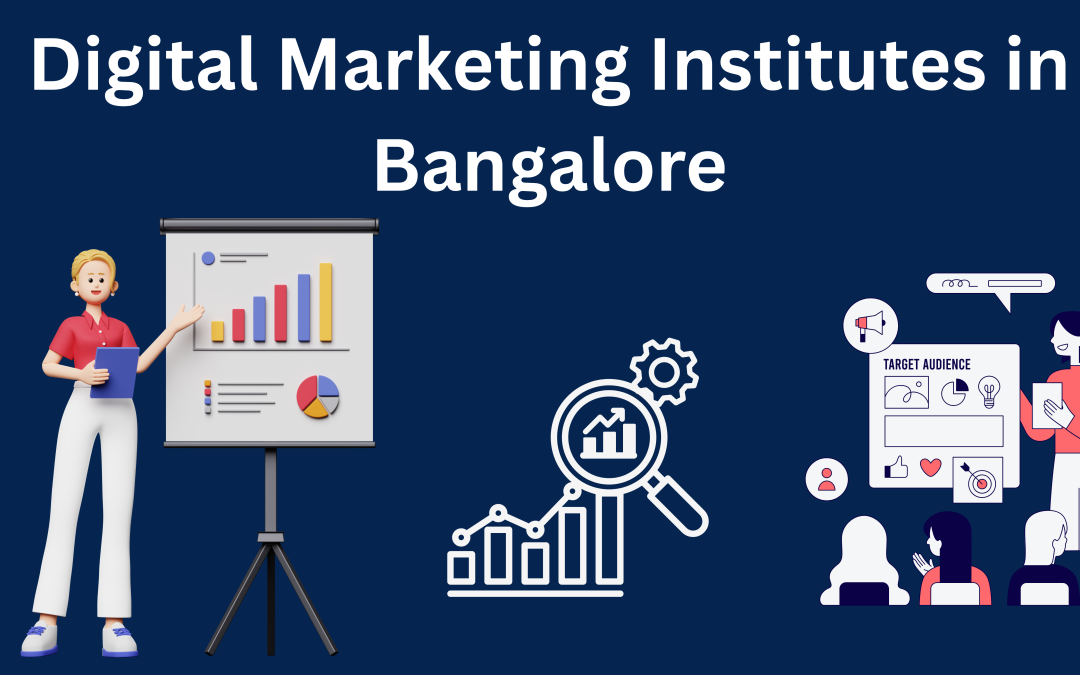
by Shashikanth Heerekar | Jun 25, 2025 | Digital Marketing
Learn about Oxygen and Kandradigital, bengaluru Digital Marketing, eMarket Education, Web Marketing Academy, and bengaluru’s , AADME Consulting & Coaching Pvt Ltd, Inventateq, BDM, iDigital Academy, EMarket Education, gmcsco, top ten digital marketing institutes. Learn about their expert training programs in SEO, social media, UI/UX, and content marketing to boost your digital skills and career.
Introduction
Bengaluru, India’s tech capital, is also emerging as a digital marketing education and skill development hub. Whether you’re a student aiming to break into the digital industry or a professional seeking to upgrade your skills, the city offers top-tier digital marketing institutes.
These training centers provide hands-on experience in SEO, social media marketing, PPC, content marketing, and more, helping individuals and businesses stay ahead in the evolving digital landscape.
Here are the top 10 digital marketing institutes in Bengaluru, with a special mention of Oxygen, a seasoned industry leader from Hyderabad making a strong impact across India.
Oxygen
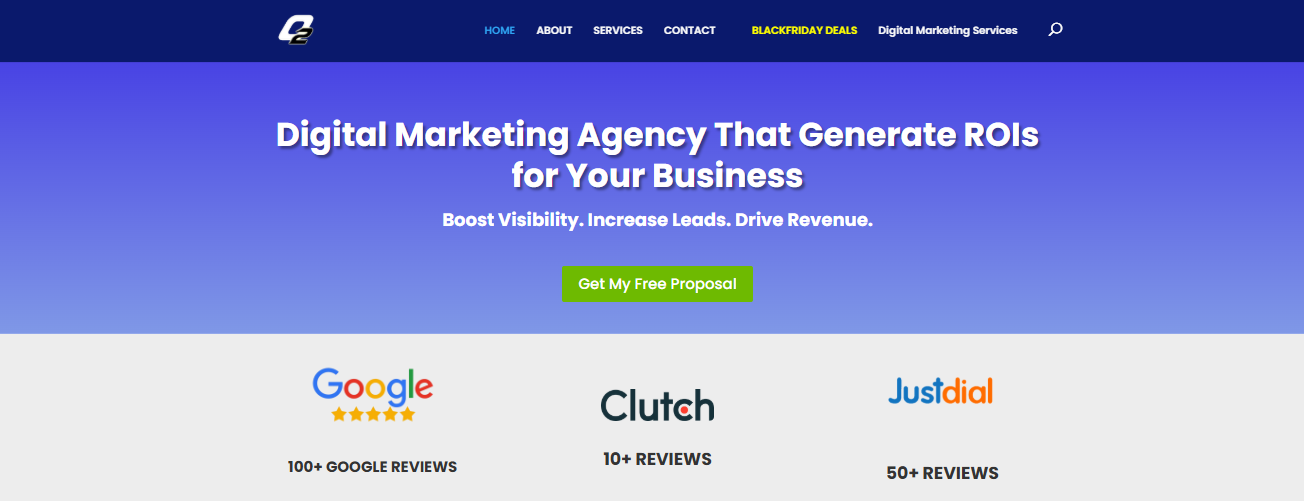
Oxygenites
Though headquartered in Hyderabad, Oxygen has earned a nationwide reputation for excellence in digital marketing education and services. With over 13 years of industry experience, Oxygen offers a robust curriculum for beginners, entrepreneurs, and working professionals.
Oxygen’s practical, real-world training sets it apart. It covers SEO, social media marketing, content creation, paid advertising, and digital analytics. The company’s trainers are industry experts who combine academic knowledge with real-world project exposure.
Contact Details
Digital Kora
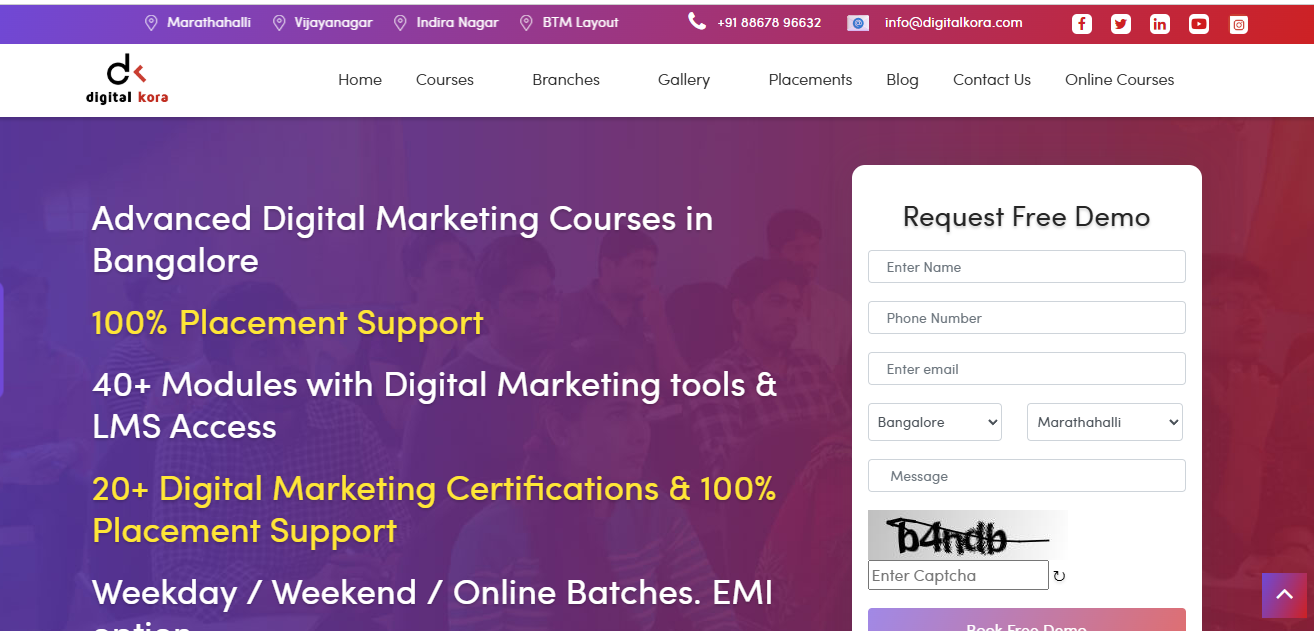
Digital kora
Digital Kora stands out as a dynamic digital marketing training institute offering a wide spectrum of specialized programs in bengaluru. With a focus on practical knowledge and real-time project exposure, it caters to individuals looking to master in-demand skills like SEO, PPC, social media marketing (SMM), email marketing, and Google Analytics. Their advanced courses—including GA4 training, Google Tag Manager, Adobe Analytics, and graphic design—ensure students are equipped with both foundational and expert-level understanding.
Digital marketing courses in bengaluruoffer hands-on training and industry-relevant skills to help individuals thrive in the competitive online landscape.
What makes Digital Kora particularly noteworthy is its inclusion of niche topics like online earning methods and training in tools such as Google Tag Manager and Adobe platforms. Their coverage across locations like BTM Layout, Madiwala, and even international extensions like Muscat reflects their commitment to accessibility and global learning reach. This institute aligns perfectly with the broader landscape of top digital marketing institutes by emphasizing hands-on learning, flexibility, and up-to-date training modules tailored to industry demands.
Courses offered
Advanced Digital marketing Training in bengaluru
Digital marketing course in bengaluru
SEO training in bengaluru
PPC training
Email Marketing Training in bengaluru
Google Analytics
Adobe Analytics
Google tag Manager Training
SMM training
online earning methods
GA4 training
Contact Details
Kandradigital
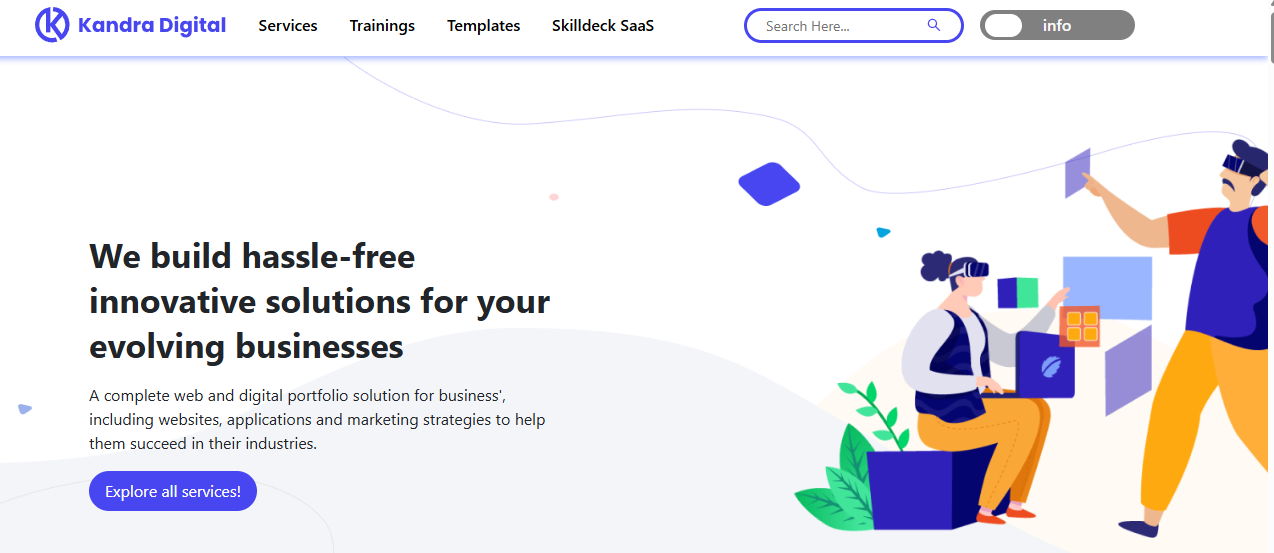
KandraDigital
KandraDigital is a bengaluru-based digital marketing training institute known for delivering premium, agency-style learning experiences tailored for graduates, working professionals, entrepreneurs, and corporate teams. What sets KandraDigital apart is its focus on hands-on, real-time, project-based learning, backed by live case studies and personalized guidance—preparing learners to meet real-world industry challenges from day one.
Recognized as one of the best digital marketing institutes in bengaluru, KandraDigital offers job-oriented training programs that include one-on-one mentorship, corporate upskilling modules, and interactive classroom sessions. The institute delivers a comprehensive suite of digital marketing courses, including
SEO (Search Engine Optimization)
Performance Marketing (Google Ads, Meta Ads, and more)
Social Media Marketing
Content Marketing
HubSpot Marketing Automation
E-commerce Marketing
Analytics & Reporting
Influencer Marketing
Email Marketing and CRM Tools
Affiliate & Programmatic Advertising
At the core of KandraDigital’s reputation is Manjunath Chowdary, a seasoned digital marketing expert with over 15 years of experience working with India’s top-tier brands such as Redbus, BigBasket, Mobikwik, Dailyhunt, UpGrad, and several global companies. Prominent for his lucidity, profound knowledge of the subject, and ability to teach in multiple languages (English, Telugu, Kannada, and Hindi), Manjunath guarantees that all students, regardless of their background, acquire a solid practical foundation and abilities that are ready for the workplace.
What makes KandraDigital unique is its dual role as both a functioning digital agency and a training hub, enabling learners to work on real-time projects under expert supervision. In addition to training, the company provides services in web development, mobile app development, and 360° digital marketing, offering students unmatched exposure to live tools, strategies, and campaigns.
Established in 2018, KandraDigital has built a strong global presence, with learners enrolling from across India and internationally through its live virtual training programs.
Whether you’re looking to launch a career in digital marketing, upskill your current role, or train your team with real-world strategies, KandraDigital offers the expertise, infrastructure, and credibility to help you succeed.
Contact Details
- Phone: +91 82964 94941
- Email: [email protected]
- Website: https://kandradigital.com/trainings
Anuvic Designs
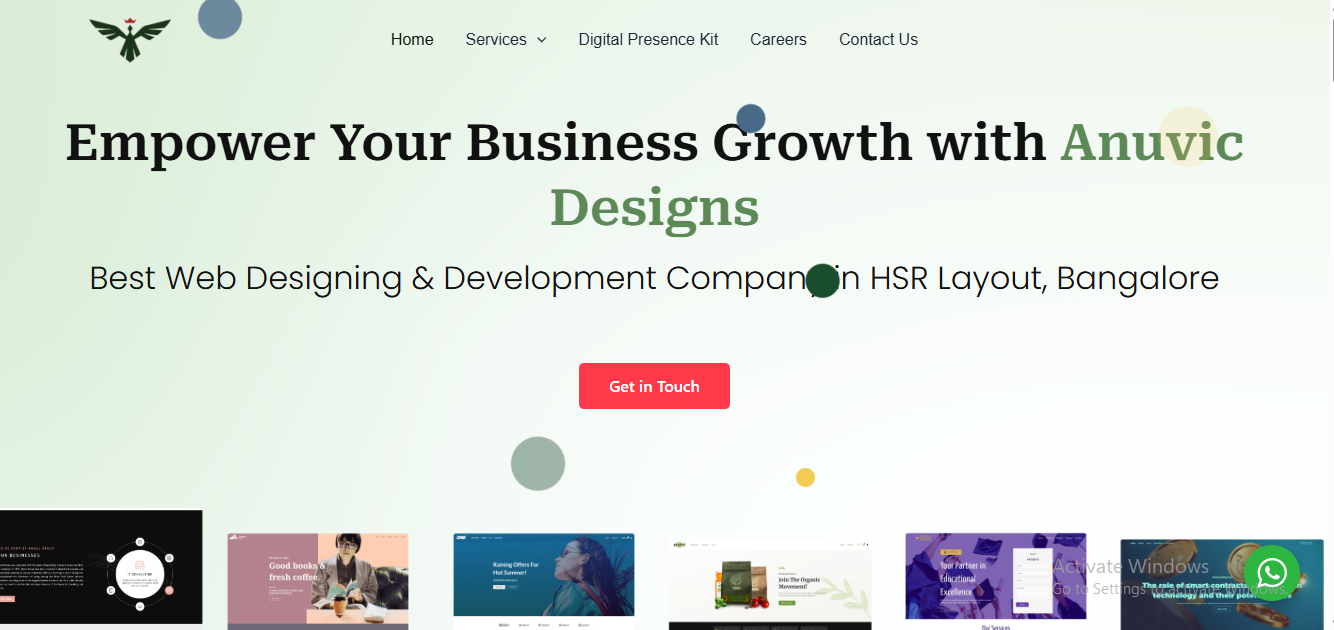
Anuvic Designs
Anuvic Designs stands out as a reliable and resourceful institute offering training in essential digital marketing disciplines. Their offerings include search engine optimization (SEO), website development, digital marketing strategies, graphic design, and mobile app development—all of which contribute to a well-rounded skill set for modern marketers.
By focusing on both the technical and creative aspects of digital marketing, Anuvic Designs ensures learners are equipped with practical knowledge that matches industry needs. Their curriculum is ideal for those seeking to gain proficiency in SEO practices, front-end development, and content-centric marketing approaches. For anyone aiming to build a solid foundation in digital marketing and related fields, Anuvic Designs is a noteworthy choice in the competitive bengaluru landscape.
Courses offered
Search Engine Optimization
website Development
Digital marketing
Mobile app Development
Graphic Design
ERP
Contact Details
AADME Consulting & Coaching Pvt Ltd

Aadme
AADME is a leading digital marketing institute known for its innovative and practical approach to digital education Their wide range of programs caters to different learning needs, including a Lifetime Mentorship Program, an intensive 4.5-month course, and a specialized Digital Marketing Course with AI—providing learners with advanced tools and insights for future-ready skills.
For those seeking faster learning options, they offer a Fast Track Program as well as an Offline Digital Marketing Course in bengaluru for hands-on classroom training 8 Weeks Business Fast Track Consulting Program for IT Founders & professionals, agencies, freelancers & business owners and they have trained 51,743+ students. AADME is highly regarded for its expert mentorship, career-focused curriculum, and strong commitment to empowering students with both foundational and advanced digital marketing skills, making it a popular choice for aspiring digital marketers in bengaluru.
Courses offered
LifeTime Mentorship Program
4.5-Month Program
Digital Marketing Course With AI
Fast Track Program
Offline Digital Marketing Course bengaluru
AI-enabled digital marketing course with paid internship
digital marketing course for freelancing
Digital Marketing Agency Building With AI
Contact Details
Web Marketing Academy
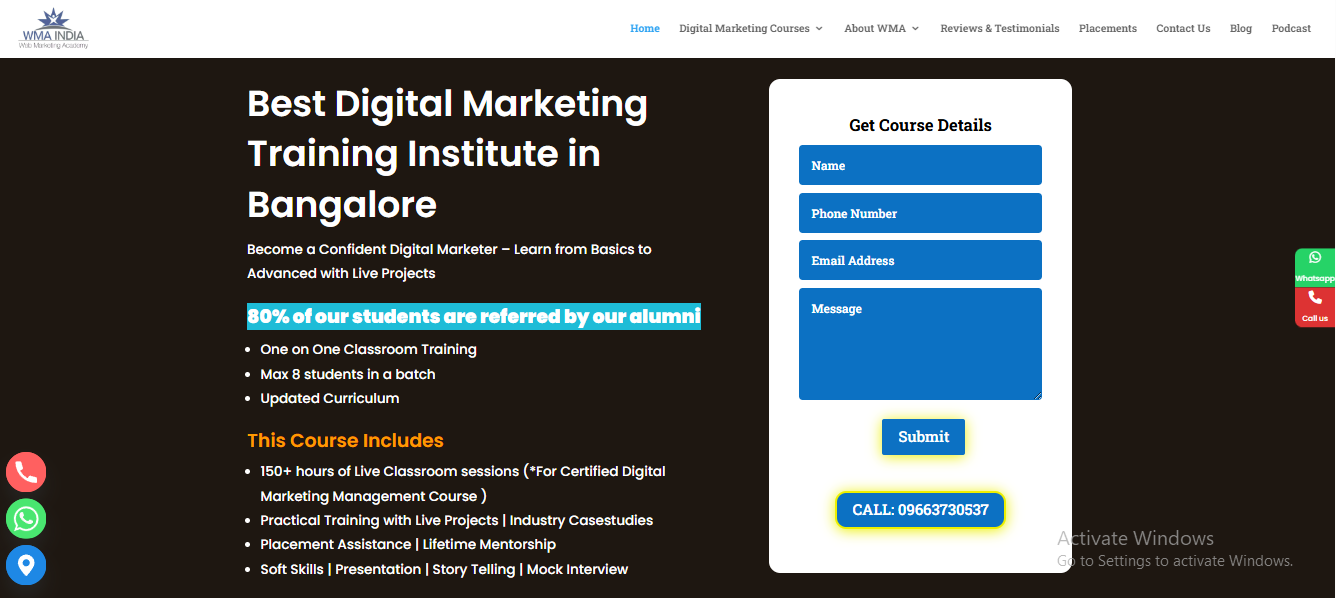
Web marketing
Web Marketing Academy (WMA) is a leading digital marketing institute in Indiranagar, bengaluru. Known for its hands-on, classroom-based training, WMA offers a comprehensive 3–4 month digital marketing certificate course. Designed for students, professionals, entrepreneurs, and freelancers, the program focuses on practical application and in-depth learning.
The course curriculum covers over 40+ modules, including website creation with WordPress, SEO (on-page, off-page, local), Google Ads (Search, Display, Shopping), social media marketing (Facebook, Instagram, LinkedIn), content creation with AI tools, email marketing, blogging, YouTube video marketing, affiliate marketing, remarketing, Google Analytics, and influencer marketing. Students also receive training on resume writing, portfolio building, and mock interviews to help with job placements or starting a freelance career.
What Makes WMA Unique:
- Small class sizes for personalized attention (max. 8-10 Students per batch)
- Real-world projects using industry tools and platforms (Live projects for each module to get a Hands-on learning experience)
- Up-to-date curriculum taught by experienced professionals (updated 2025)
- Lifetime mentorship and placement support (Job-oriented certification course)
- Proven track record with students placed in startups and top companies like Google, Facebook, TCS, Cognizant, Yahoo, Decathlon, etc.
Web Marketing Academy combines deep learning with real-world exposure, ensuring students gain the knowledge and confidence to succeed in the digital marketing industry.
Contact Details
- Phone: 9663730537
- Email: [email protected]
- Website: https://www.webmarketingacademy.in/
Inventateq
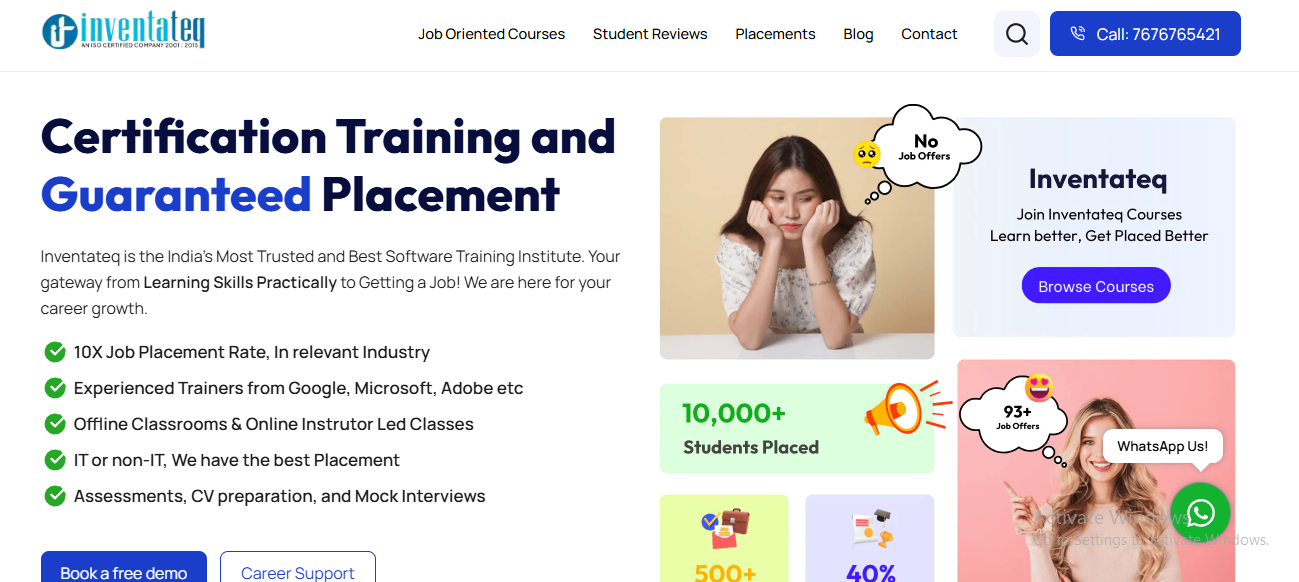
INVENTAEQ
Inventateq is a well-established digital marketing training institute in bengaluru, recognized for offering comprehensive, career-oriented courses in digital marketing and web solutions.
Their course offerings include SEO, PPC (pay-per-click), link building, social media marketing, and online reputation management, equipping students with a broad skill set in demand in today’s job market.
Inventateq also provides access to offshore hiring resources, such as SEO specialists and social media marketers, reflecting their strong industry network and practical orientation.
Additionally, learners benefit from training in web design, logo creation, and web development, making it an excellent choice for those who want both marketing and design expertise. With an emphasis on live projects, placement support, and real-world application, Inventateq continues to be a preferred digital marketing institute in bengaluru.
courses offered
Seo
Pay-per-click (PPC)
Link Building
Social Media Marketing
Online Reputation Management
Web Design
Web Development
Logo Design
Contact Details
BDM
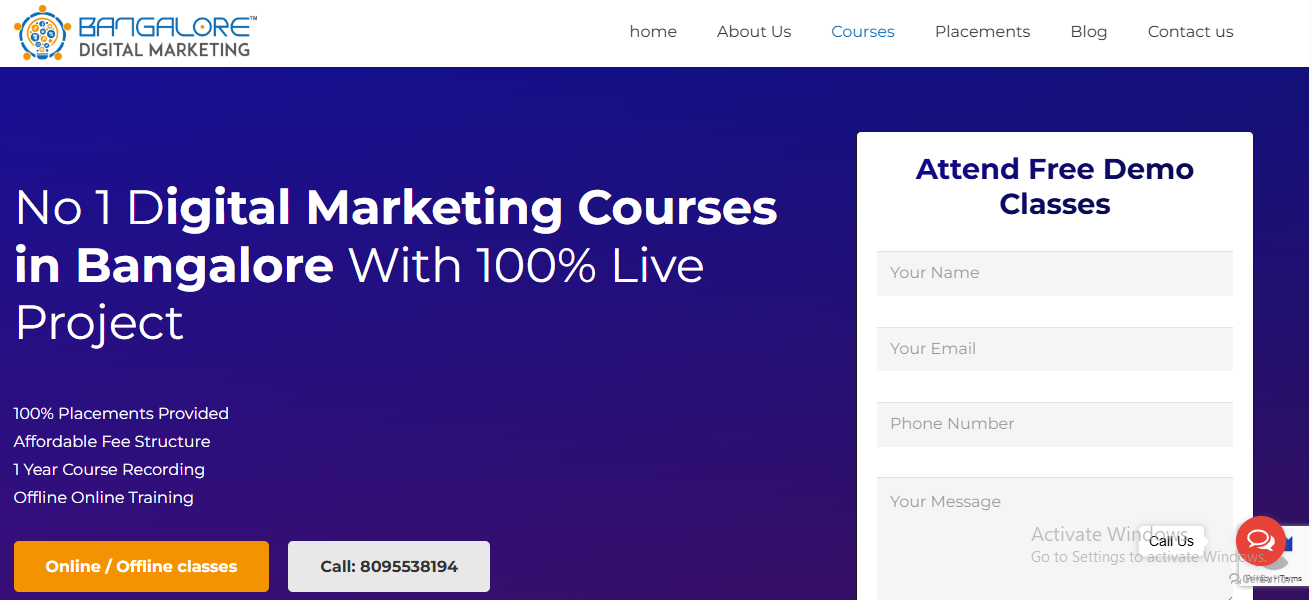
BDM
BDM is a prominent institute known for delivering comprehensive, hands-on training in key areas of the digital marketing ecosystem.
The institute offers specialized courses in digital marketing, UI/UX design, SEO, PPC training, and graphic design, catering to beginners and professionals looking to strengthen their skills.
Students benefit from practical learning modules, live project exposure, and expert mentorship that bridge the gap between academic knowledge and industry requirements.
Additionally, their social media marketing and video editing courses make them a well-rounded choice for aspiring content creators and performance marketers. With a strong emphasis on creative and technical skills, bengaluru Digital Marketing is considered one of the top digital marketing training institutes in bengaluru.
courses offered
Digital Marketing
UI/UX
SEO
graphic design
PPC training
Social media marketing
video editing
Contact Details
- Phone: 91 8095538194
- Email: [email protected]
- Website: https://bengalurudigitalmarketing.com
iDigital Academy

IDIGITAL ACADEMY
iDigital Academy is a Trusted training center in bengaluru that provides career-focused courses in graphic design and digital marketing. Renowned for its hands-on approach and knowledgeable instructors, the academy gives students exposure to real-world projects and imparts in-demand skills that are in line with current business trends.
Their Advanced digital marketing course with AI is designed to cover SEO, social media marketing, Google Ads, and content strategies, ensuring students gain the confidence and knowledge to handle real business challenges with their Agency Based Training and Internship Oppurtunities.
With flexible schedules, interactive classes, and dedicated placement support, iDigital Academy has become a go-to choice for aspiring digital professionals looking to build a strong foundation and advance their careers. They offer Classroom, Online and Corporate Training.
courses offered
Digital marketing course
Graphic Design course
Contact Details
GMCSCO Media Group
GMCSCO is a leading digital marketing company in bengaluru, widely recognized for delivering specialized training and result-driven services in the digital marketing space. Their digital marketing courses and services are thoughtfully designed to cover essential areas such as search engine optimization (SEO), WhatsApp marketing, paid advertisements, owned media optimization, and retention marketing—ensuring that learners gain hands-on expertise in all key aspects of digital marketing.
In addition to their digital marketing focus, they provide services in web development, mobile app development, and software development, helping students and professionals grasp both marketing and technical skills for comprehensive career growth. Their programs are practical, career-oriented, and ideal for learners looking to master digital marketing in today’s data-driven and competitive landscape.
courses or services offered
Web Development
Mobile App Development
Software Development
Search Engine Optimization
Paid Advertisements
Owned Media Optimization
Retention Marketing
Data Analytics & Insights
Domain, Hosting, and SSL
IT/Server Support
Contact Details
Plutowebs
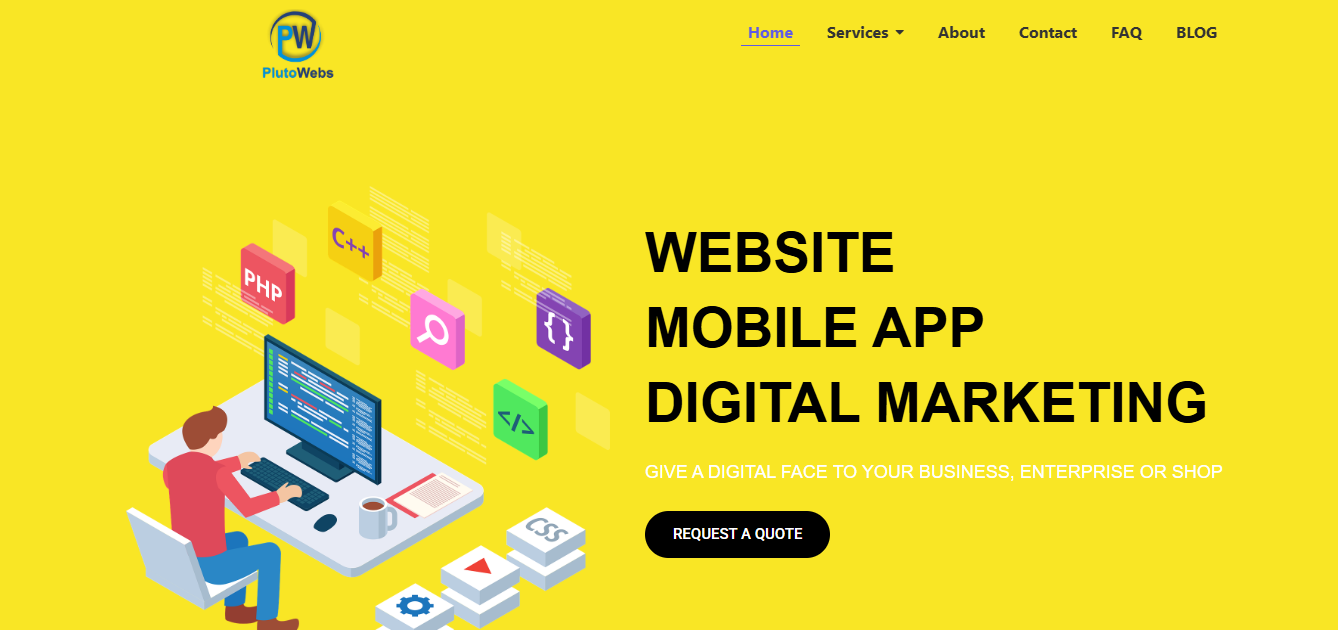
Plutowebs
Plutowebs has established itself as a well-rounded company offering highly practicalPlutoWebs is a Website Design and Development Company based in bengaluru.Their courses cover essential areas such as search engine optimization (SEO), online advertising, email and WhatsApp marketing, and influencer and affiliate marketing—ensuring learners are equipped with a comprehensive digital marketing skillset.
What sets them apart is their holistic approach that blends both traditional and modern marketing strategies. Their programs are designed to provide hands-on learning through real-time projects, making it easy for students and professionals to implement their knowledge in practical scenarios. Plutowebs is a great option for anyone looking to master digital marketing techniques and stay ahead in the ever-evolving online space.
courses or services offered
Website Design
E-commerce Websites Design
Business/Corporate Websites
Educational Websites Design
Nonprofit/Charity Websites Design
Android App Development
iOS App Development
Hybrid App Development
Native App Development
Search Engine Optimization (SEO)
Online Advertising
Email & WhatsApp Marketing
Influencer & Affiliate Marketing
Brand Identity and Logo Design
Print & Digital Media Design
Illustration & Motion Graphics
Visual Strategy & Communication
Contact Details
Marketing Launchpad by Kraftshala
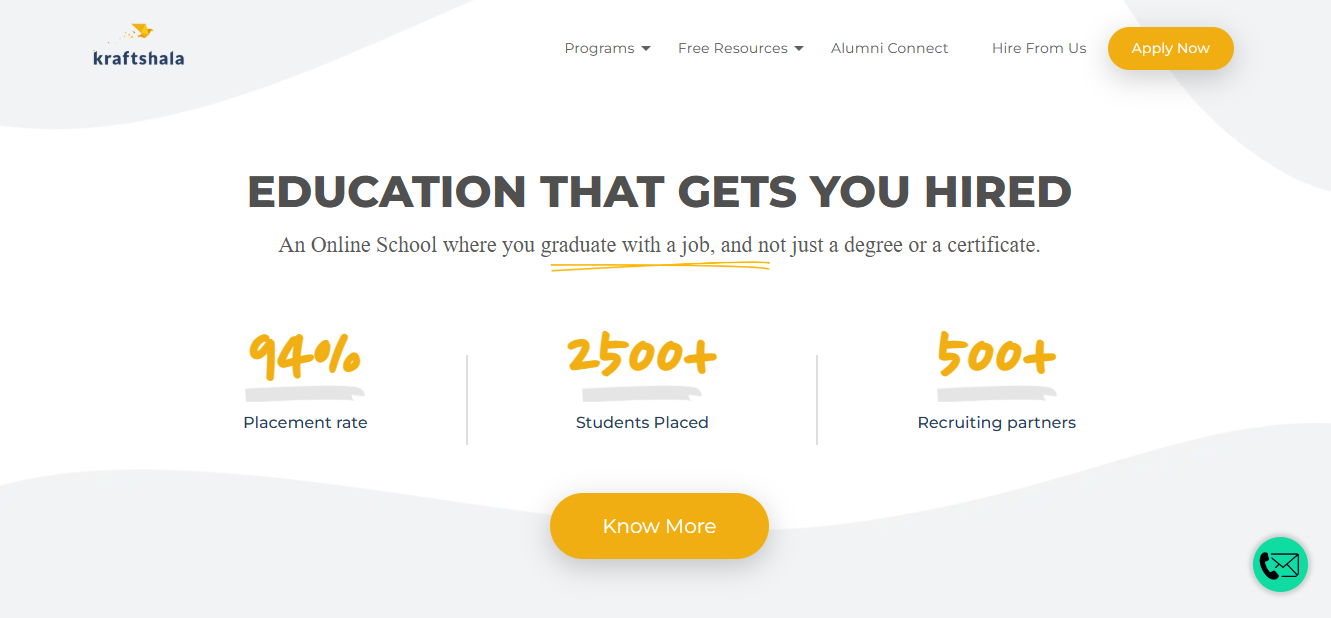
kraftshala
Kraftshala’s Marketing Launchpad is a 22 week long job-linked digital marketing course in
Bangalore with the best placement rate in India. Designed for freshers, graduates and working
professionals, the program combines intensive hands-on learning with expert mentorship from
professionals who’ve worked at top brands like Unilever, Nykaa, and Zomato.
Kraftshala also provides placement accountability where 60% fee is refunded if the student, by
any small chance, is not able to get placed at a package of ₹4.5LPA and above. The institute has
placed more than 2700 students till now at companies like Nykaa, Mamaearth, Acko, Dentsu,
GroupM, and many more.
The course features industry-relevant projects reviewed by actual digital marketing experts and
hiring managers, personalized feedback loops, and structured placement preparation. Unlike
most theoretical programs, Kraftshala’s curriculum is centered on solving real marketing
problems using tools like Google Ads, SEO tools, and Meta Ads with AI integrated in the entire
workflow.
Key Features
● Placements at packages ₹4.5 – 10.05LPA, 60% refund if not placed.
● 8 live projects with real budgets and real brands.
● Daily live sessions with top marketing professionals
● Resume workshops and reviews, mock interviews & structured job prep
● Access to tools like Google Ads, GA4, Meta Ads, etc.
Modules Covered
Performance Marketing, Programmatic Advertising, SEO & Content, Marketing Strategy, Digital
Analytics, Campaign Planning, Social Media Marketing, Content Creation, and more.
Duration
22 Weeks
Contact Details
Phone: 07827135490
E-mail: [email protected]
Website: www.kraftshala.com
EMarket Education
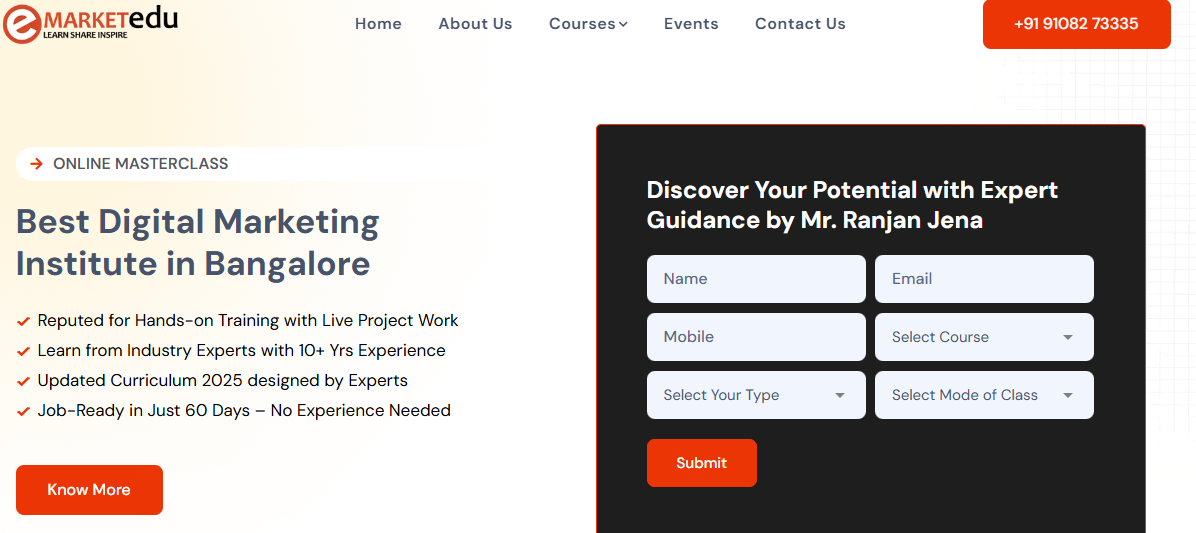
Emarketing Education
eMarket Education is one of bengaluru’s most reputed institutes. It offers specialized training in digital marketing with a strong focus on practical knowledge and career-oriented skills.
With a curriculum designed by industry professionals, the institute equips students with the essential tools and techniques to succeed in today’s competitive digital world.
Their digital marketing course covers SEO, Google Ads, social media marketing, analytics, and more, ensuring students gain real-time project experience and industry certification.
Known for its personalized mentoring, small batch sizes, and placement support, eMarket Education is a top choice for those seeking quality digital marketing training with real-world applications in bengaluru.
courses offered
Digital marketing course
PPC Google ads course
Social media marketing
SEO
Soft skills and interviews
Adobe analytics training
power BI training
Python Training
GTM training
Contact Details
- Phone: 91082 73335
- Email: [email protected]
- Website: https://www.emarketeducation.in/
Conclusion
Choosing the right digital marketing institute in bengaluru can be a transformative step in building a successful career in the digital space. Whether you’re a beginner looking to enter the field or a working professional aiming to upgrade your skills, bengaluru offers a variety of training programs that focus on practical knowledge, real-time projects, and industry-relevant tools.
These institutes provide comprehensive training in SEO, PPC, content marketing, social media marketing, UI/UX design, and more. With structured curriculums, expert trainers, and placement support, learners are equipped to meet the growing demand for skilled digital marketers across industries. Enrolling in a reliable and forward-thinking digital marketing course ensures you stay competitive in today’s fast-evolving digital economy.
FAQS
1. In digital marketing classes, what subjects are frequently covered?
A. A standard digital marketing course includes SEO, PPC, Google Ads, content marketing, social media marketing, email marketing, analytics, and sometimes UI/UX and video editing.
2. Can I learn digital marketing online from bengaluru institutes?
A. Many institutes offer flexible online training modules that include live classes, recorded sessions, and one-on-one mentoring, making it easy for remote learners to gain valuable skills.
3. What job role is available after completing a digital marketing course?
A. Graduates can pursue roles such as SEO specialist, social media manager, content marketer, PPC analyst, digital strategist, UI/UX associate, or marketing automation executive.
4. How long will it take to complete a digital marketing course?
A. The duration can range from 1 to 6 months depending on the depth of the course, delivery mode, and whether it includes internships or capstone projects.
5. In a course on digital marketing, what kinds of tools are usually taught?
A. Courses often include hands-on training in tools like Google Analytics, Google Ads, SEMrush, Ahrefs, Canva, Meta Business Suite, Mailchimp, and WordPress.
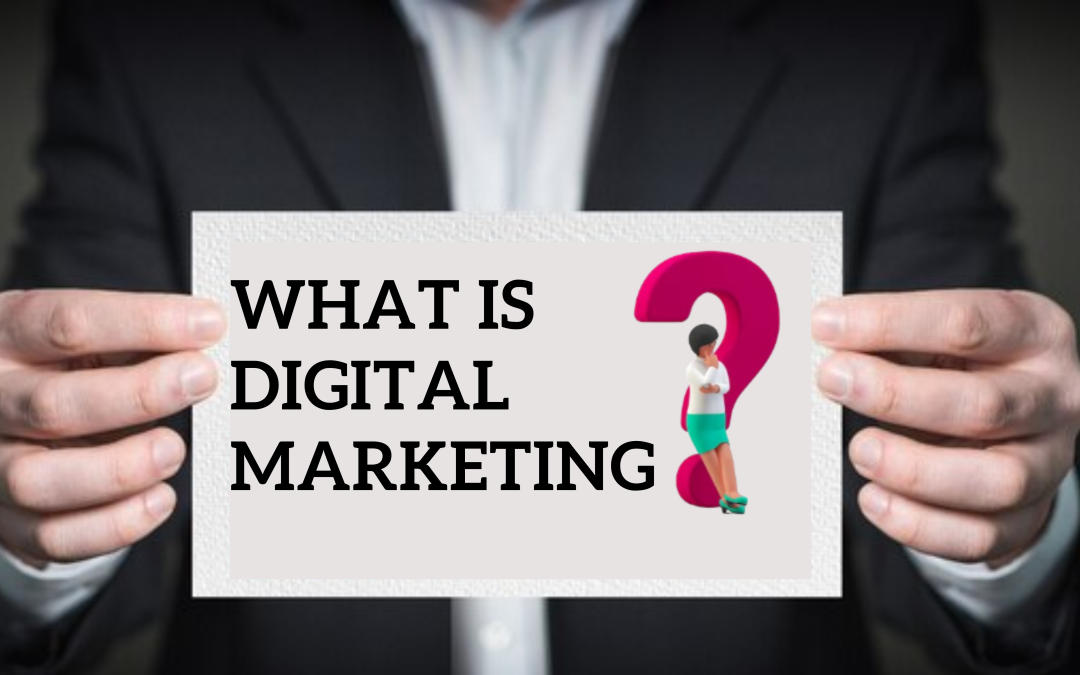
by Shashikanth Heerekar | Jun 4, 2025 | Digital Marketing
Discover what digital marketing is, explore types like SEO and PPC, learn benefits for small businesses, and get started with easy steps. Read more now!
What is Digital Marketing?
Digital marketing is the way of promoting your business or product using the internet and digital tools. It is different from old-style marketing, like posters or newspapers. In simple words, digital and marketing go together when you use online ways to talk to people about your brand.
Now, digital marketing is very popular because most people are using phones, websites, and social media. So, using digital marketing helps a business grow fast and reach many people. This is why many companies use marketing and digital marketing together to get good results.
Types of Digital Marketing
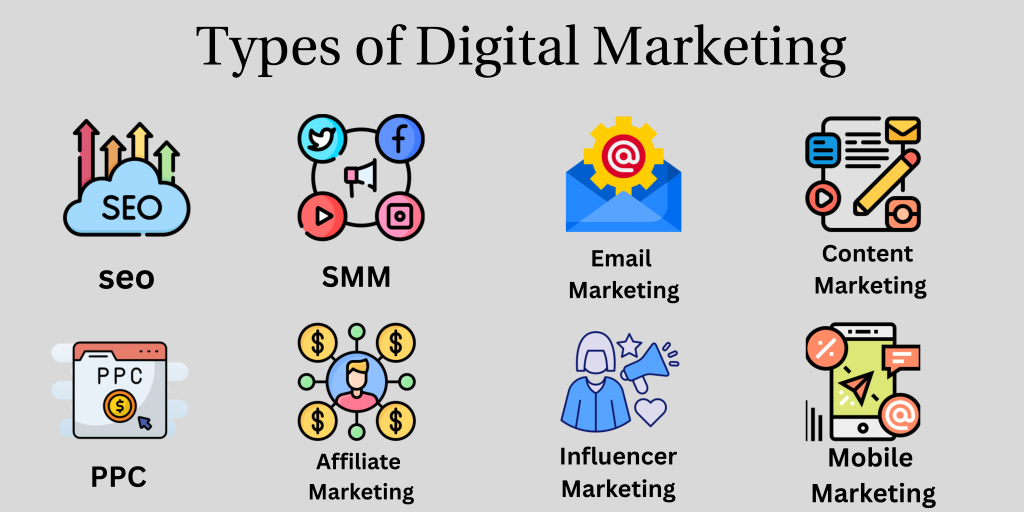
Search Engine Optimization (SEO)
Digital marketing includes SEO, which makes your website rank higher on Google. When someone searches for something, SEO makes sure your website shows up. This is an important digital marketing strategy because people usually click the first result. SEO is like a map that brings people to your website. It is a very important part of internet marketing and online business marketing.
Social Media Marketing (SMM)
Social media marketing is using Facebook, Instagram, YouTube, and other apps to show your products. This is one of the most used digital marketing strategies. Many companies use digital and online marketing on these platforms. With the help of online internet marketing, you can talk to people directly. It is a fun way to connect with users and tell them about your business.
Email Marketing
Email marketing is sending emails to customers. These emails can be about new products, offers, or news. It is part of the digital marketing process. Digital marketing and email marketing work well together. Email marketing helps you keep in touch with old customers and get new ones too. This is a good example of digital marketing.
Content Marketing
Content marketing is about writing helpful things like blog posts, videos, or images. It is a very smart digital strategy for marketing. This is because people love reading useful stuff. For example, if someone reads a blog about shoes, they may end up buying a pair. Content is so crucial to digital strategy and marketing.
Pay-Per-Click (PPC) Advertising
PPC means paying money for every click you get on your ad.When someone clicks on your advertisement on Facebook or Google, you are charged. This is used in digital marketing campaigns. It brings fast traffic to your website. PPC is a part of online marketing and internet marketing. It helps when you want fast results.
Affiliate Marketing
Affiliate marketing is when someone else sells your product and you give them a small amount of money. Many websites use this internet marketing strategy. This digital marketing strategy helps both the business and the person selling.
Influencer Marketing
Influencers are people who have many followers on Instagram or YouTube. In this digital and internet marketing method, you ask them to promote your brand. It is very effective for new products. Influencers help companies do digital promotion strategies easily.
Mobile Marketing
Mobile marketing is when you use phones to send messages, ads, or push notifications. It is part of online marketing strategy. Many people use phones, so mobile marketing is growing in the digital marketing industry. This is a smart online business marketing strategy.
How Digital Marketing Works
Digital marketing works in steps. First, you create content or ads. Then, you choose where to show them (Google, Instagram, email). People click and visit your website. Then they may buy or contact you. Digital marketing as a whole makes use of tools like emails, PPC, and SEO. The digital marketing process is simple but needs good planning. It is used in digital marketing and sales too.
Note: Digital marketing means using internet tools to help your business get noticed and grow. The digital marketing strategy definition is simple: plan + platform + message = result.
Benefits of Digital Marketing
Digital marketing gives many benefits. First, it is cheap. You can promote your brand with less money. Second, you can reach people all over the world. Third, you can see how many people saw your ad and clicked. That means you can check what works and what doesn’t. This is very helpful for digital marketing in the United States. Digital marketing USA companies use it daily.
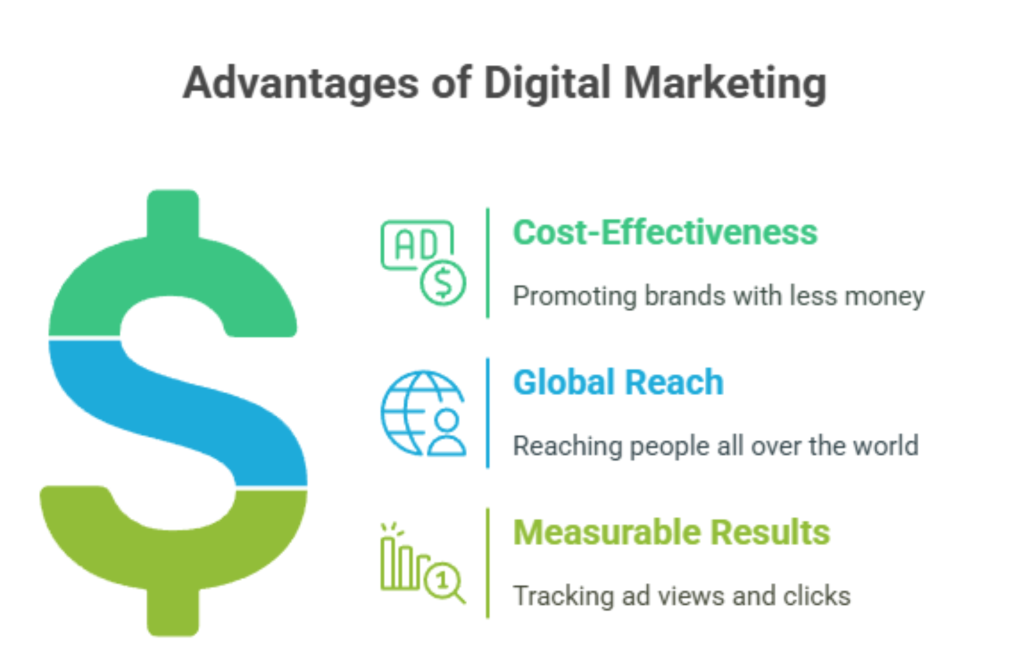
Digital Marketing for Small Businesses
Small businesses can use local SEO, social media, and Google My Business. This helps them get customers nearby. Digital marketing for businesses gives them a chance to compete with big brands. Online marketing for businesses helps them grow slowly. For example, a bakery can use Instagram to show cake photos and get new orders. This is how digital marketing helps small shops.
Note: Even if you have a small shop, you can use digital marketing and online marketing to grow your sales.
Common Digital Marketing Strategies
Some good strategies are using SEO and content marketing together. Many companies do email marketing and social media at the same time. Some use retargeting ads. That means they show the ad again to people who visited their website. These are parts of a marketing strategy, digital and online marketing advice. A good digital strategy for marketing helps you get more customers.
Challenges in Digital Marketing
There is a lot of competition. Many businesses are using the same digital marketing strategy for business. Also, websites like Google and Facebook change rules. You must keep learning. Understanding digital marketing helps you stay up to date. Internet marketing business changes quickly. So you must be ready. Even the best digital marketers organization keep learning new things.
How to Get Started in Digital Marketing
You can watch free videos, read articles about digital marketing, or join a course. Create a blog or Instagram account and begin practising. Try learning SEO, email marketing, and content creation. Many people start with small freelance jobs. Understanding marketing is easy if you take one step at a time.
Note: To do online marketing for business, start small. Pick one method, practice it, and then learn more.
Conclusion
So, what is digital marketing? It is a way to promote your business using the internet. From SEO to email to social media, digital marketing helps you reach more people. Every company today needs digital and marketing help. The digital marketing concept is simple but powerful. Even if you are just starting, digital marketing is for you. Whether you are in the US or anywhere in the world, online marketing can help your business grow.
FAQs
Q: What is digital marketing?
The practice of advertising goods or services online is known as digital marketing.It uses tools like websites, social media, emails, and search engines. This helps businesses reach more people and grow faster.
Q: How does digital marketing work?
It works by creating online content or ads and showing them on platforms like Google or Instagram. When people click, they visit your site and may buy or contact you. This step-by-step method brings traffic and sales.
Q: What are the main types of digital marketing?
The main types include SEO, PPC, content marketing, email marketing, and social media marketing. Each type helps attract different kinds of customers. Using them together improves your chances of success.
Q: What makes digital marketing crucial for small companies?
It’s affordable and helps small businesses reach more people online without spending too much. Local SEO and social media can bring nearby customers. This gives small shops a chance to grow and compete with big brands.
Q: What are the benefits of digital marketing?
Digital marketing is cost-effective, gives fast results, and allows you to track performance. You can reach a global audience from your phone or laptop. It helps you improve campaigns and get better returns.
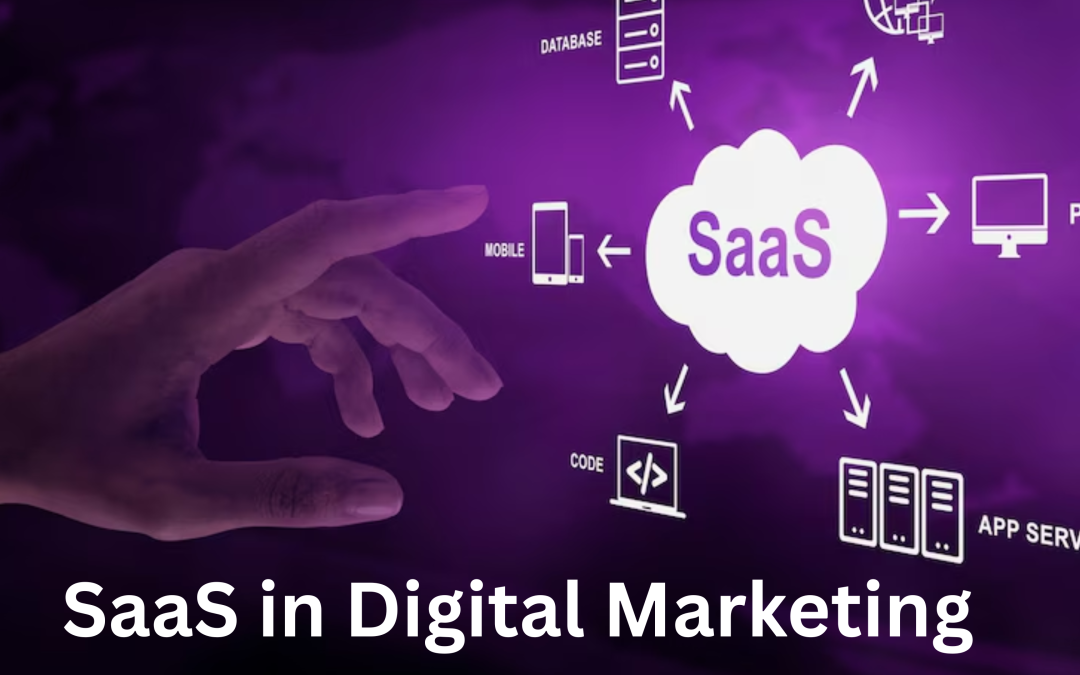
by Shashikanth Heerekar | Mar 29, 2025 | All Things about Marketing, SEO News, Technology
Unlock the full potential of SaaS in digital marketing. Our ultimate guide covers everything from the basics to advanced strategies for using SaaS to automate, optimize, and amplify your marketing efforts.
Introduction
In today’s fast-paced digital world, SaaS digital marketing is essential for businesses looking to scale efficiently. With the right digital marketing strategy for SaaS, companies can automate tasks, improve customer engagement, and boost ROI. SaaS digital marketing strategy focuses on leveraging cloud-based tools to streamline operations. The demand for digital marketing for SaaS companies is growing rapidly, making it crucial for businesses to adapt.
From automation to analytics, SaaS digital marketing simplifies complex marketing processes. If you’re in digital SaaS, understanding its impact can give you a competitive edge. Let’s explore how the SaaS digital marketing strategy is transforming the industry.
How SaaS is Transforming Digital Marketing
1. Automation & Efficiency
One of the biggest advantages of digital SaaS is automation, which allows businesses to save time and resources. With the right SaaS digital marketing strategy, companies can automate tasks like email campaigns, social media posts, and lead nurturing. Digital marketing for SaaS companies benefits from tools like Mailchimp, ActiveCampaign, and HubSpot for customer engagement.
Social media automation tools such as Buffer and Hootsuite make social media marketing for SaaS seamless. CRM software like Salesforce helps track customer interactions efficiently. What’s more, many SaaS platforms can also automate document processing, streamlining workflows for contracts, reports, and other marketing materials. This level of automation improves consistency and enhances customer experience.
2. Data-Driven Decision Making
A strong SaaS digital marketing strategy is built on data, helping businesses make informed decisions. Analytics tools like Google Analytics, Ahrefs, and SEMrush empower digital marketing for SaaS companies with deep insights.Additionally, SaaS conversion tracking enables businesses to measure key actions, like free trial sign-ups, user registrations, or purchases, offering a precise view of campaign effectiveness.
AI-powered platforms enhance SaaS performance marketing by predicting customer behavior and trends. Digital marketing for SaaS companies relies on real-time data to optimize campaigns and maximize ROI.
By analyzing performance metrics, businesses can refine their digital marketing strategy for SaaS. SaaS platforms provide automated reports, making data analysis quick and accurate. Implementing a SaaS digital marketing strategy ensures continuous improvement and better marketing outcomes.
3. Cost-Effectiveness & Scalability
Unlike traditional marketing, SaaS digital marketing offers cost-effective solutions that grow with your business. With subscription-based pricing, SaaS companies can access premium tools without large upfront investments. Cloud-based platforms ensure businesses only pay for what they use, improving financial efficiency. Additionally, cloud cost monitoring tools provide real-time insights, helping companies track and optimize their cloud usage to further reduce unnecessary expenses.”
A well-planned digital marketing strategy for SaaS allows for scalable marketing efforts as businesses expand. Companies can easily upgrade or downgrade their SaaS digital marketing plans based on their needs.
This flexibility makes marketing digital SaaS an ideal choice for startups and enterprises alike. Scalability ensures that the SaaS digital marketing strategy evolves with industry trends and market demands.
Top SaaS Tools for Digital Marketing
1. SEO & Content Marketing Tools
SEO is a fundamental part of SaaS digital marketing, helping businesses rank higher on search engines. Ahrefs and SEMrush provide keyword insights crucial for a strong digital marketing strategy for SaaS. SurferSEO optimizes content structure, enhancing digital marketing for SaaS companies. Moz and Ubersuggest are also useful for competitive analysis in SaaS digital marketing.
AI-driven tools generate content ideas, making SaaS performance marketing more effective. These platforms automate keyword tracking, improving digital marketing for SaaS. Using SEO tools effectively is key to a successful SaaS digital marketing strategy.
2. Email Marketing Platforms
A robust SaaS digital marketing strategy includes email automation to nurture leads and retain customers. Mailchimp offers AI-driven personalization, enhancing digital marketing for SaaS companies. ConvertKit specializes in audience segmentation, improving SaaS performance marketing. ActiveCampaign integrates with CRM, making it ideal for SaaS digital marketing. Automated email sequences streamline communication, strengthening digital marketing for SaaS engagement.
Real-time analytics help measure the effectiveness of SaaS digital marketing strategy campaigns. A well-structured email marketing strategy is a crucial part of marketing digital SaaS success.
3. Social Media Management Tools
Social media is essential for SaaS digital marketing, helping brands build visibility and engagement. Buffer schedules posts across multiple platforms, optimizing social media marketing for SaaS efforts. Hootsuite provides analytics that enhance SaaS performance marketing strategies.
Sprout Social allows businesses to monitor audience interactions, improving SaaS digital marketing engagement. AI-powered tools like Lately repurpose content, making digital marketing for SaaS more efficient.Businesses use automation and tools like a social media post maker to maintain consistent social media presence in SaaS digital marketing strategy.
4. Customer Relationship Management (CRM)
CRM software plays a key role in SaaS digital marketing, helping manage customer relationships. HubSpot CRM automates sales and marketing efforts, strengthening digital marketing for SaaS companies. Salesforce offers AI-powered analytics, optimizing SaaS performance marketing. Zoho CRM integrates seamlessly with email marketing, enhancing the SaaS digital marketing strategy.
Personalization tools in CRM platforms improve SaaS customer marketing effectiveness. Automated workflows ensure businesses provide timely support in digital marketing for SaaS. A well-implemented CRM system is crucial for long-term SaaS digital marketing success.
Challenges of Using SaaS in Digital Marketing
1. Data Security & Privacy
Despite its advantages, SaaS digital marketing faces security risks that businesses must address. Data breaches can impact digital marketing for SaaS companies, leading to compliance issues. Secure cloud storage solutions are essential for protecting sensitive SaaS digital marketing data. Companies must follow data protection laws while implementing SaaS performance marketing strategies low- code platforms.
AI-driven cybersecurity measures help strengthen digital marketing for SaaS security. Regular security audits minimize vulnerabilities in SaaS digital marketing strategy execution. Implementing strong security protocols ensures safe marketing digital SaaS operations.
2. Integration Issues with Other Tools
Many businesses struggle with tool integration in SaaS digital marketing, affecting workflow efficiency. CRM, SEO, and social media platforms must sync for an effective SaaS digital marketing strategy. API compatibility plays a crucial role in seamless digital marketing for SaaS companies’ operations. iPaaS solutions support these integrations by providing a unified approach to connecting diverse tools.Cloud-based automation tools help bridge gaps in SaaS digital marketing systems. Businesses must invest in platforms with flexible integrations for smooth SaaS performance marketing.
AI-driven solutions help resolve compatibility issues in marketing digital SaaS strategies. A strong integration plan ensures optimized SaaS digital marketing strategy execution.
SaaS link building services play a vital role in boosting domain authority and driving organic traffic. By securing high-quality backlinks, these services enhance the visibility and credibility of SaaS platforms in competitive markets.
Future of SaaS in Digital Marketing
The future of SaaS digital marketing is shaped by AI, automation, and data analytics. AI-driven insights will refine SaaS performance marketing, leading to smarter campaigns. No-code and low-code platforms will simplify digital marketing for SaaS companies operations. Personalization will become a core part of SaaS digital marketing strategy.
Predictive analytics will enhance decision-making in digital SaaS campaigns. Augmented reality (AR) will redefine engagement strategies in SaaS digital marketing. Businesses must adopt emerging trends to stay ahead in digital marketing for SaaS.
Conclusion
A strong digital marketing strategy for SaaS is key to achieving business growth and success. Leveraging the right SaaS digital marketing tools helps companies scale operations efficiently. Automation, AI, and data-driven insights drive success in digital marketing for SaaS companies. Businesses must focus on personalization and integration to enhance SaaS performance marketing.
Social media and CRM strategies play a crucial role in SaaS digital marketing strategy. Staying updated with trends ensures a competitive edge in marketing digital SaaS. Implementing an effective SaaS digital marketing strategy is essential for long-term business success.
Frequently Asked Questions (FAQs)
1. What is SaaS digital marketing?
SaaS digital marketing refers to the strategies and techniques used to promote Software-as-a-Service (SaaS) products online. One of the most performance-driven approaches is ppc for saas, which allows for precise targeting and measurable results. It includes SEO, content marketing, PPC, email marketing, social media marketing for SaaS, and more. A strong digital marketing strategy for SaaS helps in customer acquisition, retention, and brand awareness.
2. How is digital marketing for SaaS different from traditional marketing?
Unlike traditional marketing, SaaS digital marketing is data-driven, highly scalable, and focuses on recurring revenue models. It includes SaaS performance marketing, customer retention strategies, and subscription-based growth tactics. Digital marketing for SaaS companies relies heavily on automation, analytics, and inbound marketing techniques.
3. What are the best SaaS digital marketing strategies?
Some of the most effective SaaS digital marketing strategies include SEO, PPC advertising, content marketing, email automation, and social media marketing for SaaS. Businesses should focus on SaaS performance marketing, lead nurturing, and data-driven decision-making for better ROI.
4. Which tools are best for SaaS digital marketing?
There are many tools available for SaaS digital marketing, depending on the marketing goals. SEO tools like Ahrefs and SEMrush, email marketing tools like Mailchimp and ActiveCampaign, CRM platforms like HubSpot and Salesforce, and social media marketing for SaaS tools like Buffer and Hootsuite are some of the best options.
5. How can SaaS companies improve their digital marketing performance?
To improve SaaS digital marketing performance, businesses should focus on audience segmentation, personalization, and data analytics. Using SaaS digital marketing strategy, they can optimize their campaigns, improve conversion rates, and enhance customer engagement. Regularly tracking metrics and refining marketing tactics are key to success in digital marketing for SaaS companies.
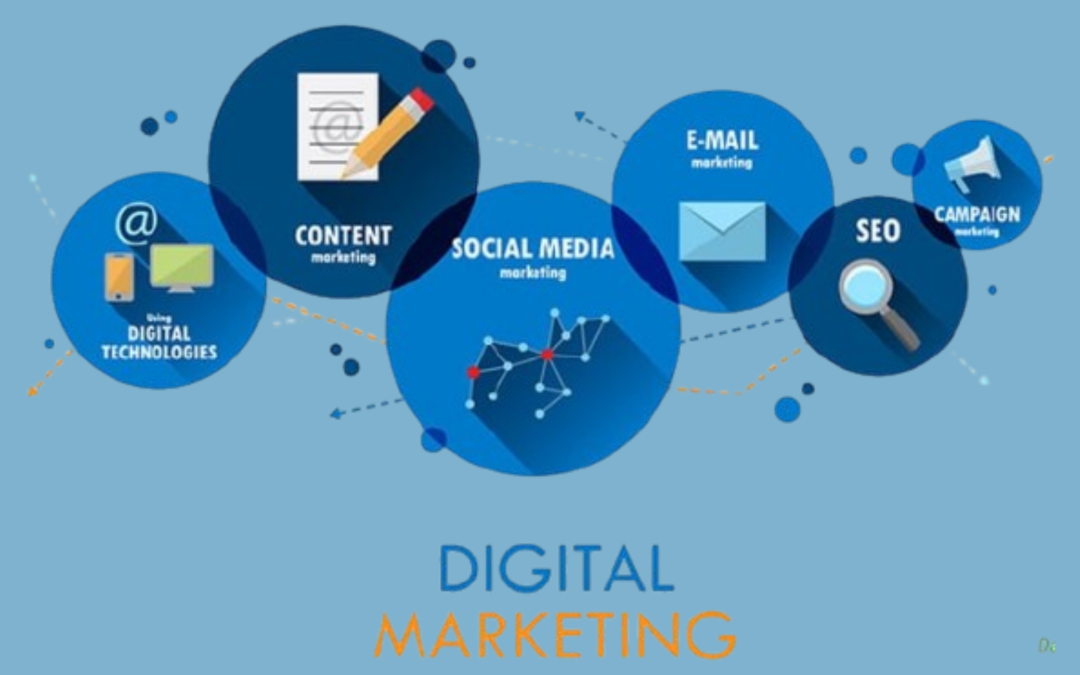
by Shashikanth Heerekar | Mar 15, 2025 | Digital Marketing
Is digital marketing growing? Explore the latest trends, stats, and future insights to understand why digital marketing is booming in 2025 and beyond.
Introduction
Digital marketing has become an essential part of modern business strategies. Over the last decade, the digital marketing industry has seen unprecedented growth, transforming how businesses interact with customers, generate leads, and drive sales. As technology evolves, companies shift from traditional marketing methods to digital platforms, creating vast opportunities for growth and innovation. This article will explore how digital marketing is growing, the factors driving this growth, and why businesses must adopt digital strategies to stay competitive in the modern marketplace.
The Rapid Growth of Digital Marketing
The rise of the internet and mobile technology has significantly impacted how businesses reach consumers. According to recent reports, the global digital marketing industry is valued at over $350 billion and is expected to grow at a CAGR (Compound Annual Growth Rate) of 17.6% from 2024 to 2030. Several factors, including increased internet penetration, the rise of social media, and the growing use of mobile devices, drive this remarkable growth.As the demand for skilled professionals continues to rise, many aspiring marketers are enrolling in the best digital marketing institute in Hyderabad to gain hands-on knowledge and stay ahead in this rapidly evolving field.
1. Increased Internet Usage and Mobile Penetration
Today, more than 5.4 billion people worldwide have access to the internet, which translates to nearly 65% of the global population. This widespread connectivity has created a massive online audience, making it easier for businesses to engage with potential customers. Additionally, over 90% of internet users access the internet via smartphones, creating a mobile-first landscape where companies must optimize their strategies for mobile platforms.
2. The Rise of Social Media Marketing
Social media platforms such as Facebook, Instagram, TikTok, LinkedIn, and Twitter have become central to digital marketing strategies. Over 4.9 billion people actively use social media worldwide, providing businesses with direct access to potential customers. Paid advertising, influencer marketing, and organic content have become powerful tools for reaching target audiences and building brand awareness.
3. The Growth of E-Commerce and Online Shopping
The e-commerce sector has seen explosive growth, particularly after the COVID-19 pandemic. Global e-commerce sales are projected to reach $6.3 trillion in 2025. This shift has forced businesses to enhance their online presence through targeted advertising, content marketing, and search engine optimization (SEO) to capture consumer interest and drive sales.
Key Factors Driving the Growth of Digital Marketing
Several key factors are contributing to the rapid growth of digital marketing:
1. Data-Driven Decision Making
The availability of big data and advanced analytics tools allows businesses to track user behaviour, measure campaign performance, and optimize strategies in real-time. Tools such as Google Analytics, SEMrush, and HubSpot enable marketers to analyze key metrics and adjust their tactics for better results.
2. Personalization and Customer Targeting
Digital marketing enables businesses to create personalized customer experiences. Marketers can use artificial intelligence (AI) and machine learning to analyze customer behaviour and preferences to deliver tailored content and offers. Studies show that 80% of consumers are likelier to purchase from brands offering personalized experiences.
3. Automation and AI in Marketing
Marketing automation tools such as Mailchimp, Marketo, and ActiveCampaign have streamlined the process of managing email campaigns, social media posts, and customer interactions. AI-powered chatbots, predictive analytics, and automated content creation have also enhanced customer engagement and lead generation.
Types of Digital Marketing Driving Business Success
Digital marketing encompasses a wide range of strategies and channels that businesses use to reach their target audience:
1. Search Engine Optimization (SEO)
SEO remains a cornerstone of digital marketing. Businesses can improve their search rankings and drive organic traffic by optimizing website content for search engines. Effective SEO strategies include keyword research, on-page optimization, backlink building, and technical SEO improvements.
2. Pay-Per-Click Advertising (PPC)
PPC advertising allows businesses to display ads on search engines and social media platforms. Platforms like Google Ads and Facebook Ads enable companies to target specific demographics and pay only when users click on their ad. PPC campaigns provide quick visibility and measurable results.
3. Social Media Marketing
Social media platforms allow businesses to engage with customers directly, build brand loyalty, and drive website traffic. Engaging content, influencer collaborations, and paid promotions are effective strategies for expanding reach and increasing engagement.
4. Content Marketing
Content remains king in digital marketing. High-quality blogs, videos, infographics, and whitepapers help businesses establish authority, engage audiences, and improve SEO performance. According to statistics, companies that use content marketing generate 67% more leads than those that don’t.
5. Email Marketing
Email marketing remains one of the highest ROI-generating digital marketing channels. Personalized email campaigns, automated follow-ups, and segmentation strategies enable businesses to nurture leads and convert them into loyal customers.
6. Influencer Marketing
Influencer marketing leverages the reach and credibility of social media personalities to promote products and services. Studies show that 49% of consumers rely on influencer recommendations when purchasing.
Challenges in the Digital Marketing Industry
Despite its rapid growth, the digital marketing industry faces several challenges:
1. Increased Competition
As more businesses adopt digital marketing strategies, competition for online visibility and customer attention has intensified. To stand out, companies must develop unique and engaging content.
2. Privacy Regulations and Data Protection
With the introduction of privacy laws such as the General Data Protection Regulation (GDPR) and the California Consumer Privacy Act (CCPA), businesses must comply with strict data protection regulations while collecting and using customer data.
3. Ad Fatigue and Consumer Trust Issues
Consumers are exposed to thousands of ads daily, leading to ad fatigue and declining engagement rates. To overcome this, businesses must focus on delivering high-quality, relevant content and building trust with their audience.
Future Trends in Digital Marketing
Several emerging trends will shape the future of digital marketing:
1. Voice Search Optimization
With the growing use of voice assistants like Alexa and Google Assistant, optimizing content for voice search will become crucial for maintaining search visibility.
2. Video Marketing and Live Streaming
Video content continues to gain popularity, with platforms like YouTube, Instagram, and TikTok driving engagement. Live streaming and interactive videos will grow significantly in the coming years.
3. AI and Machine Learning
AI-powered marketing tools will continue to improve customer targeting, content creation, and campaign performance. Predictive analytics and automated decision-making will enhance marketing efficiency.
4. Augmented Reality (AR) and Virtual Reality (VR)
AR and VR technologies will provide immersive brand experiences, allowing customers to interact with products and services virtually.
Conclusion
Digital marketing is growing at an unprecedented pace, driven by technological advancements, changing consumer behaviour, and the increasing importance of data-driven strategies. Businesses that adapt to these changes and leverage digital marketing effectively will gain a competitive edge in the marketplace. From SEO and content marketing to social media and AI-driven automation, the opportunities in digital marketing are vast and continue to expand. As the digital landscape evolves, businesses must stay ahead by embracing innovative strategies and adapting to changing market conditions.
FAQ’s About Digital Marketing Growth
1. Why is digital marketing growing so fast?
Digital marketing is growing rapidly due to increased internet usage, mobile penetration, and the rise of social media. Businesses are shifting from traditional marketing to online platforms because it allows them to reach a wider audience, target specific demographics, and measure results more accurately. The demand for data-driven strategies and personalized customer experiences also fuels this growth.
2. How does social media impact digital marketing growth?
Social media platforms like Facebook, Instagram, and TikTok provide businesses with direct access to billions of users. Marketers can create targeted ads, engage with followers, and collaborate with influencers to increase brand awareness and drive traffic. The ability to track performance in real time makes social media a powerful tool for growth.
3. What are the most effective types of digital marketing?
SEO, PPC advertising, content marketing, social media marketing, and email marketing are the most effective types of digital marketing. Each strategy helps businesses increase visibility, generate leads, and build customer relationships. Combining these methods enhances overall marketing performance.
4. What challenges do businesses face in digital marketing?
Businesses face increased competition, privacy regulations, and ad fatigue. With more companies adopting digital strategies, it’s harder to stand out. Privacy laws like GDPR and CCPA require careful customer data handling, while overexposure to ads can reduce customer engagement.
5. What is the future of digital marketing?
The future of digital marketing includes AI-driven automation, voice search optimization, video marketing, and AR/VR experiences. Personalization and predictive analytics will play a significant role in improving customer targeting and engagement. Businesses that adapt to these trends will maintain a competitive edge.


















